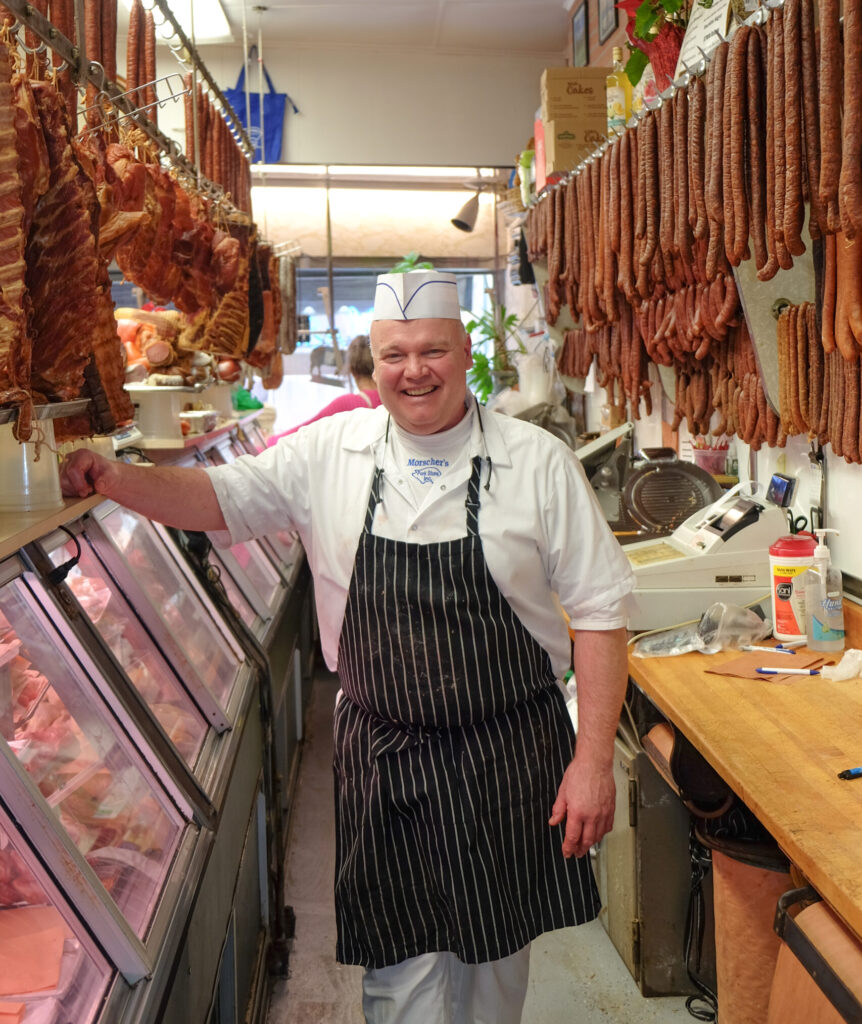
“it’s nothing to smile about.” Herb Morscher at Morscher’s Pork Store. Credit: Charlie Finnerty
By Charlie Finnerty | cfinnerty@queensledger.com
The ownership of Morscher’s Pork Store announced the beloved butcher shop will close its doors February 3 after nearly 70 years serving Ridgewood. Co-owner Herb Morscher said the decision to close is a result of his business partner Siegfried Strahl, who owns the building, raising the rent nearly four times over when their current lease expires in March. Morscher has worked at the shop since 1981 when he was 15 years old.
“We’ve supplied people with the flavor that reminded them of back home, no matter where they came from. Whether they’re from Europe or South America, there’s something here that somebody would know back home,” Morscher said.
Herb’s father’s cousin founded Morscher’s in 1955 and the shop has been at the current location on Catalpa Avenue since 1957.
“I just feel bad for my staff, I have some great people working here,” Herb said. “In order to do this work, you have to have a passion. You have to put your time in.”
Herb said he always feared the shop’s future could be uncertain under control of Strahl and was hesitant to bring his son into the business for that reason.
“I really wanted to have my son come in, but having a senior partner like that I didn’t want to break my son’s heart,” Herb said. “I just had something in me saying it’s not a good idea and I was right. I thank god that everything worked out for my kids. My daughter’s a nurse practitioner and my son is a New York City fireman and it’s all good. It’s all good.”
Although his son never formally entered the business, Herb said his family filling in when help was needed at the shop has been crucial to Morscher’s daily operation.
“I thank my family. How many times my wife came here to help. She works full time and she would come here after work and we’d work late with my daughter and my son. They all helped,” Herb said. “I’m blessed with a great family.”
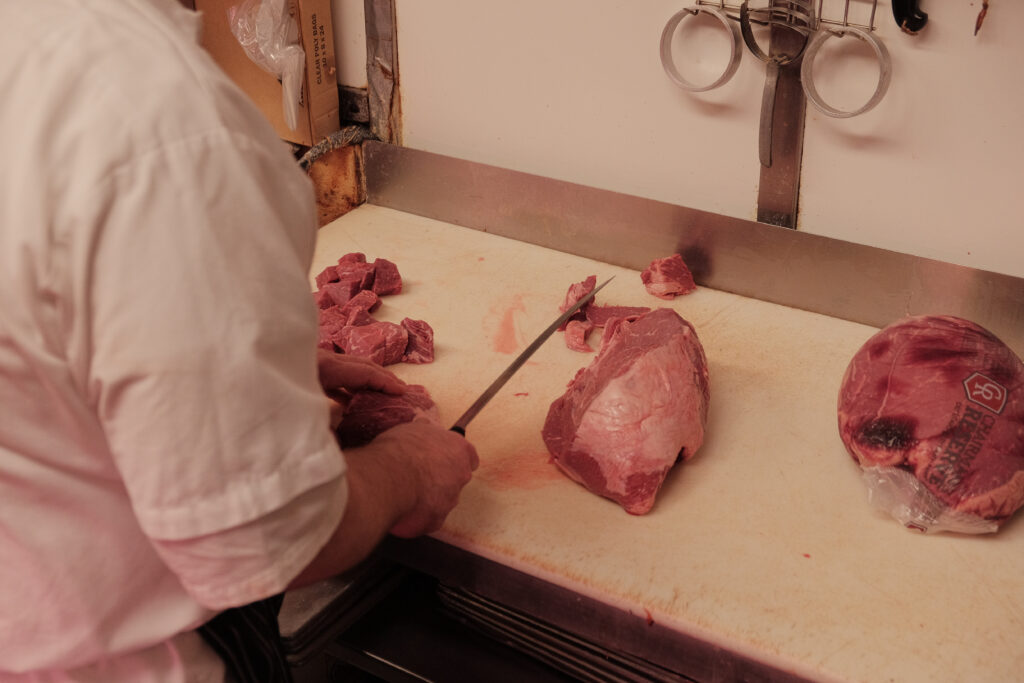
Herb Morscher at Morscher’s Pork Store. Credit: Charlie Finnerty
While Herb speaks about the difficult decision to close the business, the phone rings. He picks up the receiver, his gloved hand covered in pork grease, and his face begins to show disdain.
“Oh, you’re a vulture,” Herb says into the phone. “No vultures here. Take it easy.”
The caller is trying to buy the store’s equipment for a discounted rate after hearing about the closure. Herb laughs while he hangs up the phone.
“I’m old school, man. Maybe I’m wrong, but I can’t change who I am,” Herb picks up his cleaver and turns back to the large pork shoulder he has been slicing. “These guys come in after you and they pick at you. Get the f— outta here.”
It is not the only time Herb is interrupted while speaking about the shop’s history. A constant stream of lifelong dedicated customers make their way in the door from the snow outside, many of them middle-aged Eastern European women who have called Ridgewood their home for decades. Each one greets Herb warmly and asks about his family, switching between German, Polish and English. Voices crack and eyes begin to water when the conversation inevitably turns to the store’s limited days left.
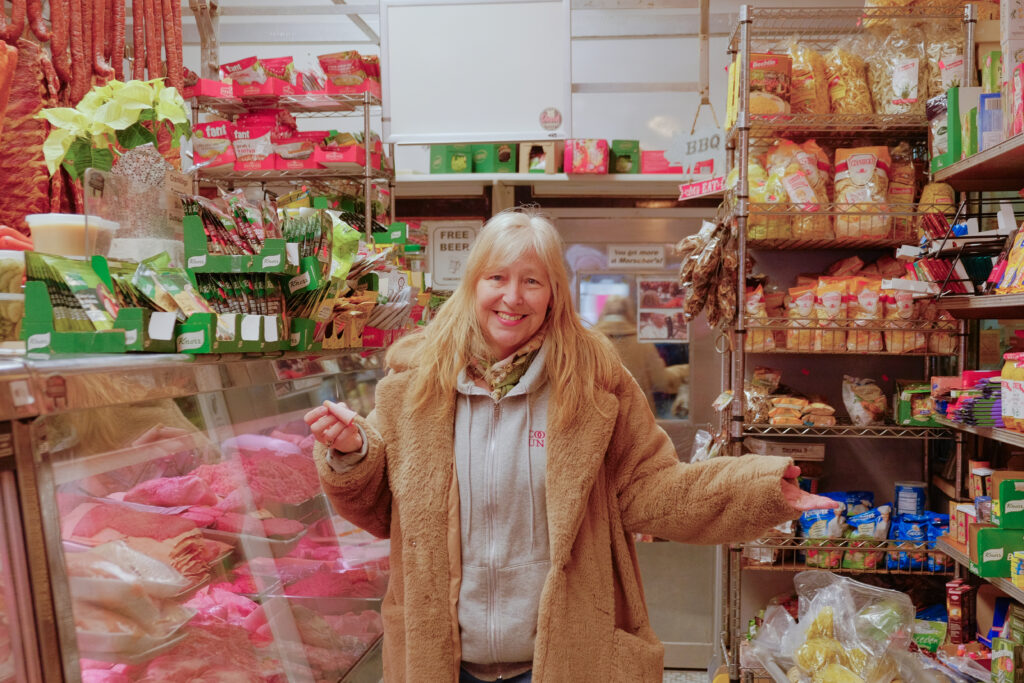
Heidi Belay at Morscher’s Pork Store. Credit: Charlie Finnerty
Heidi Belay grew up going to Morscher’s with her parents to buy all the family’s meats. Her father was close friends with the founder Joseph “Pepi” Morscher.
“It’s going to be a big loss,” Belay said. “It’s going to be a part of history that’s ended. Very sad… Oh, I’m gonna cry.”
Belay remembers the workers behind the counter giving her a piece of meat to eat while her mother shopped at Morscher’s when she was a child. As she makes her way out of the store, she asks the woman behind the counter for a small piece of meat to take with her.
Greta Jaklitsch moved to Ridgewood from Austria in 1959 and would accompany her mother to Morscher’s. She has been a lifelong customer ever since. As she makes her way to the counter her eyes wander, taking in every detail of the store.
“Even when I moved to Flushing, I would come into Ridgewood every other weekend to get stuff for my mother because she wanted certain things here,” Jaklitsch said. “She was already losing her memory but she remembered Morscher’s. They all came from the same area of Austria.”
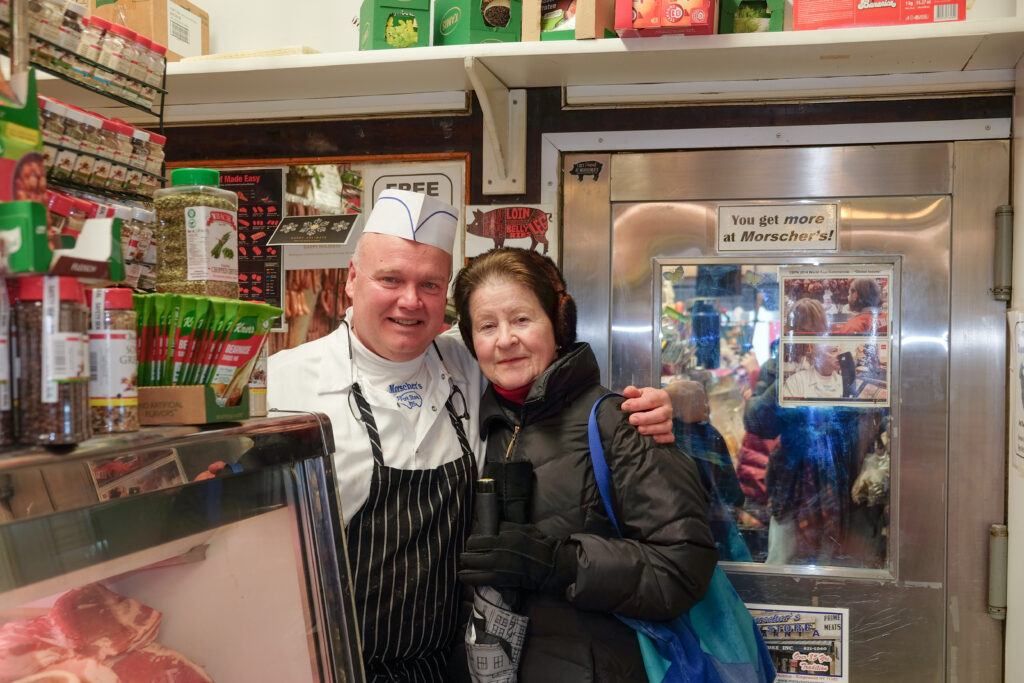
Greta Jaklitsch and Herb Morscher at Morscher’s Pork Store. Credit: Charlie Finnerty
Jaklitsch has been a close friend of the Morscher family since her childhood in Ridgewood.
“I knew [Herb’s] father. I saw his father at his mother’s funeral and he was already not fully functioning,” Jaklitsch said. “I said to him, ‘Hi Herbie, how are you?’ and he looked at me and he said, ‘Did we ever dance at Polka?’ I said ‘Yes we danced many Polkas.’ He died three weeks later.”
Jaklitsch turns to Herb at the end of the counter, “I’veI danced with this guy too, but I loved his father.”
She poses for a photo with Herb and they speak together in hushed tones at the back of the shop away from the busy counter. Jaklitsch begins to cry.
“It’s nothing to smile about,” Herb says.
Jaklitsch gathers her bag of pork and makes her way to the door.
“It’s heartbreaking,” Jaklitsch says with tears in her eyes and begins to chuckle. “What am I going to eat in two weeks?”
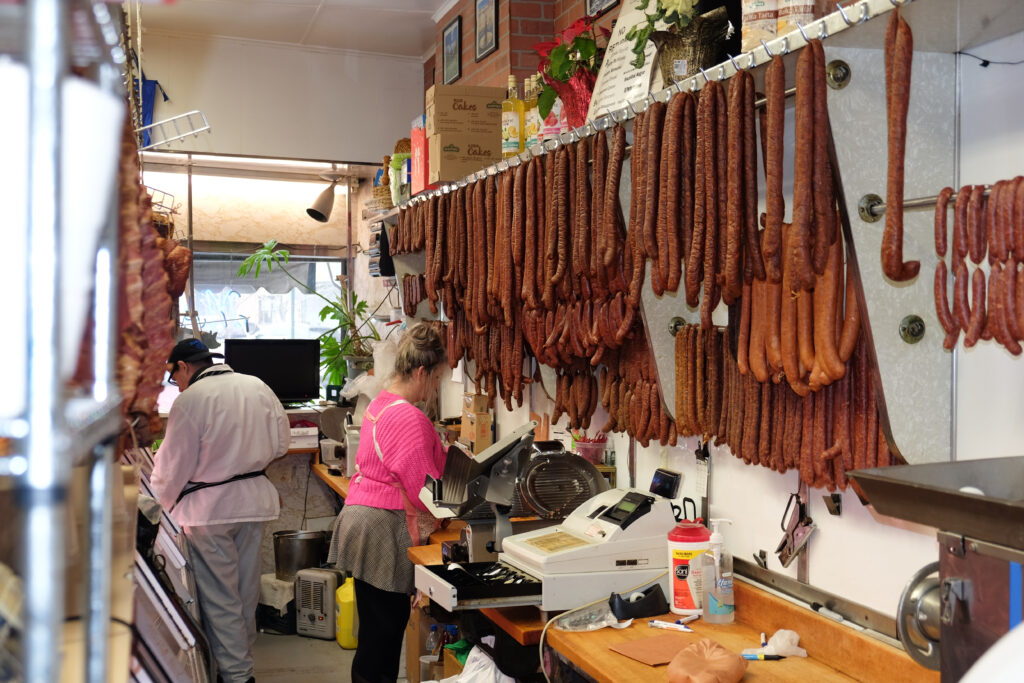
Morscher’s Pork Store. Credit: Charlie Finnerty
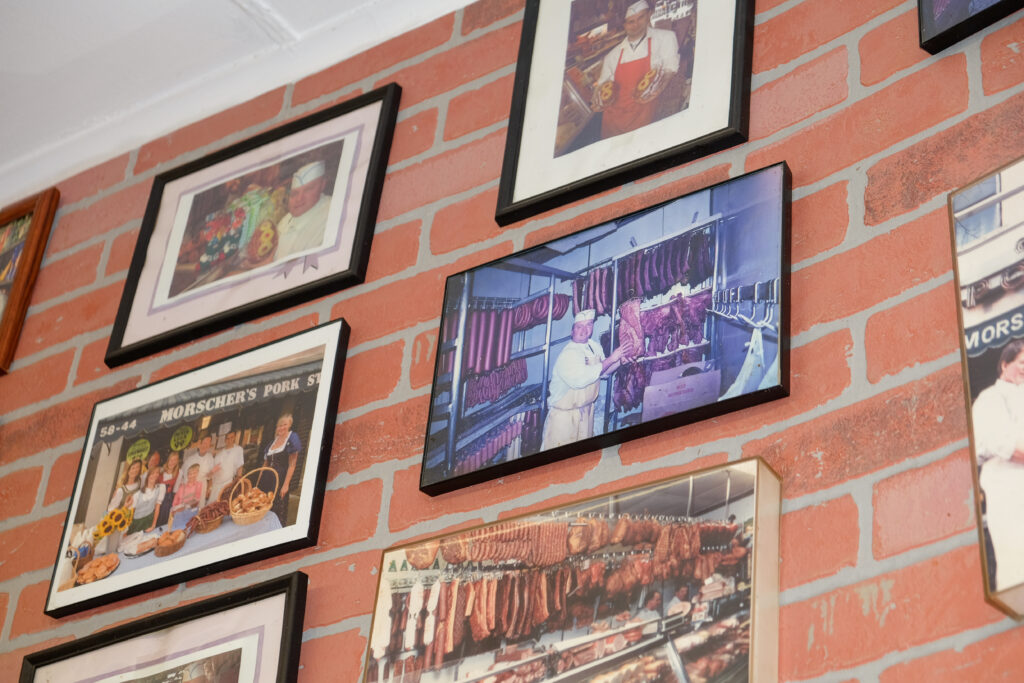
Morscher’s Pork Store. Credit: Charlie Finnerty
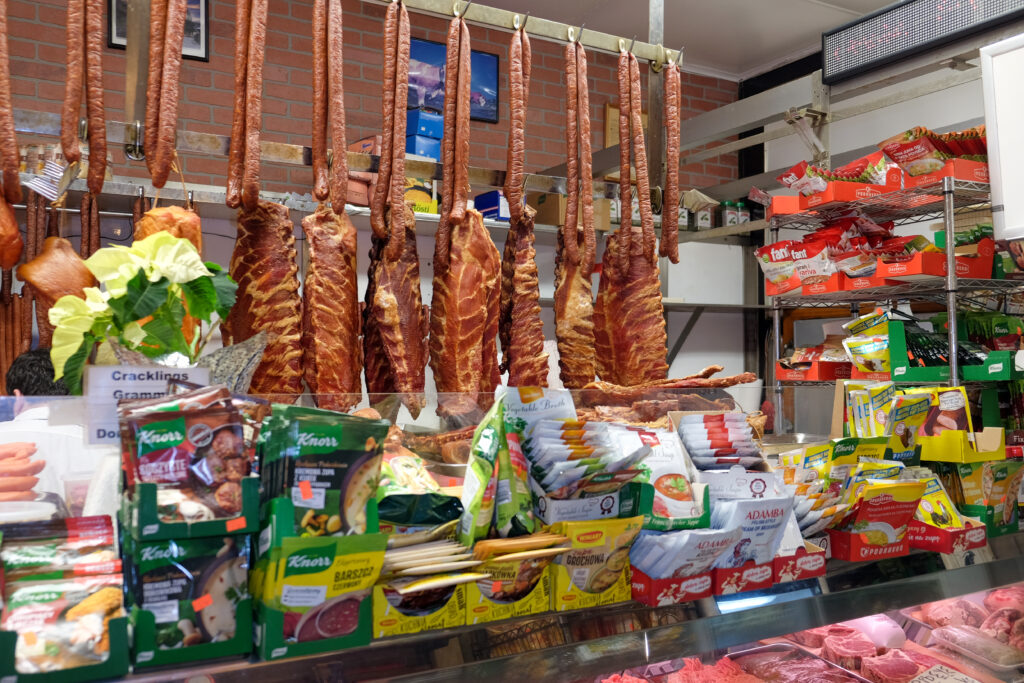
Morscher’s Pork Store. Credit: Charlie Finnerty




